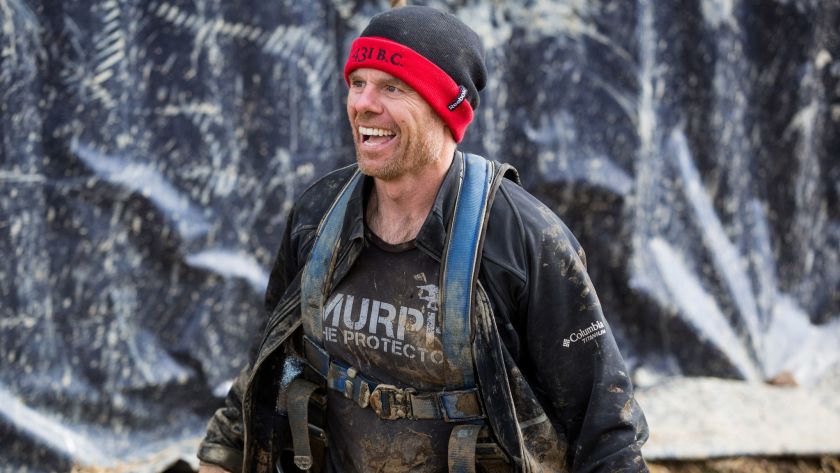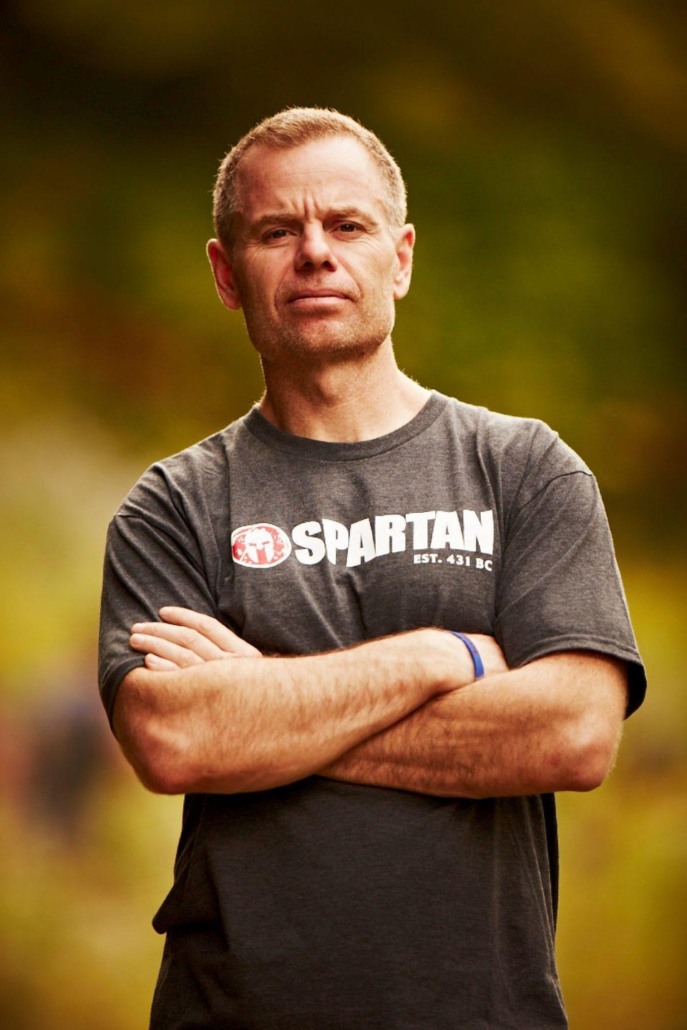Joe De Sena: Spartan Race Founder and CEO

Three hundred against a million.
On a thin strip of land, between mountains and the Aegean Sea, King Leonidas and his 300 Spartans stood ready to repulse the hordes of Persian invaders. The field of battle was haunting. Geothermic pools spewed sulfur gas into the air, perpetuating the myth that the gates of Hades were hidden in the hills. And the stakes could not have been higher. If King Xerxes’ armies continued their conquering march, Greece would fall.
Never tell a Spartan something is impossible.
Xerxes demanded surrender; Leonidas deferred. Told to lay down his weapons, the Spartan king yelled, “Mono labe.” Translation: Come and take them.
Fighting shoulder-to-shoulder with their shields as their primary defense, the Spartan soldiers formed an impenetrable wall. Armed with long spears and deadly short swords, their discipline and training repealed Xerxes’ elite army. A lifetime of suffering and service had prepared them for the three days of battle. Asked what the Spartans would do when the Persians black out the sky with their arrows, Spartan warrior Dienekes said, “in umbra igitur pugnabimus.” Meaning, they’ll fight in the shade.
Theirs was a noble defeat. Leonidas and his Spartan warriors fought to the last man. And because of their sacrifice, they gave the rest of Greece time to organize a counterattack at Salamis and then deliver the final blow to Persia at the Battle of Plataea.
And while time eventually defeated Sparta, the Spartan tradition has been resurrected with Joe De Sena.
Death Race
Joe grew up thousands of miles from Sparta. Born in Howard Beach, Queens, he was a born entrepreneur. His first business was selling fireworks to his classmates before the school’s dean shut him down. A T-shirt business followed until he moved on to a pool cleaning business. He had over 750 customers by the time he sold the business for half a million dollars.

Armed with a degree from Cornell, he took his talents to Wall Street to work as an equities and derivatives trader. The money was good—really good. But as his nerve and intellect were challenged, his body was getting soft. He packed on 30 pounds. This motivated him to begin endurance training and running ultramarathons. Joe competed in events like Ironman and the Furnace Creek 508 Bike Race, a brutal 500+ mile race through the Mojave Desert and Death Valley.
His epiphany came in the wilderness of Quebec. He found himself stranded during a 350-mile endurance race, forced to survive the night in a snow cave. The temperature was inhumane, dropping to minus 30 degrees.
“Quitting wasn’t an option—there was no plan B,” Joe says. “There’s no tapping out. There, in that hole, you learn the difference between difficult and desperate.”
Joe survived and used this experience as inspiration for his own event, Death Race. Grueling doesn’t begin to describe this multiday adventure race. It punishingly combines military survival with extreme distances. Hosted on his farm in Vermont, few showed up, and even fewer finished. But Joe’s laconic message was spreading—discipline, endurance, commitment—and the world was listening.
From these humble beginnings, Spartan Race was born.
The Easy Epidemic
Completing a Spartan Race isn’t complicated.
You’re required to run, jump, crawl, climb, and carry things over a set distance. The sprint is three miles, super is eight miles, and the beast clocks in at 13 miles. Sounds simple enough until you consider the race is designed to push you to your limits. Joe is convinced the world has made us soft. Only by challenging ourselves daily can we grow.
“Good isn’t enough,” Joe says. “You’ve got to be the best version of yourself. You have to constantly push yourself out of your comfort zone.”
Stagnation causes entropy. It’s in your best interest to be uncomfortable, hungry, and distressed. These are good things.
“Two hundred years ago, people needed soft couches,” Joe says. “Life was tougher back then. Now, everything is handed to us on a silver platter. There’s no magic pill to achieve success. It comes from hard work.”
Asked how to get off the couch, Joe’s answer was curt: “Just get off the couch.” It’s this type of tough love he uses to encourage the athletes who live on his farm. Your body and your mind are one. And just like lifting weights builds muscles, practicing resilience builds grit. You can only build grit by practicing the hard stuff in life.
Integrate Your Life
On paper, Joe’s message is perfect in its simplicity. It’s in the application one can fall short.

He strongly believes in personal accountability. Going to start jogging every morning? Let people know so they can support and hold you to it. Doing 30 pullups every day? Get going, but make sure you follow through. Joe is a steadfast man, but he’s also smart enough to know when you have to pivot from your goals. You need to know your true north and make adjustments to reach where you want to go.
“What do you value most?” Joe asks. “You have to know what is most important in your life and pursue it with dogged resilience.”
For Joe, his true north is discovering his limits and smashing through. He preaches life integration. Time is one resource you can’t make more of, and Joe uses every moment to push himself. He’s the guy cheering at his kid’s basketball game while doing burpees in the corner. It might look like organized chaos, but this is where Joe thrives.
Technology has made our lives simpler, but we’re shackled to our phones. Consider finding something to eat. Today, everything is available at the click of an app, but it used to be different. Between meals, we were forced to venture out.
“We were forced to hunt or gather our meals because we didn’t have delivery,” Joe says. “You were hiking or riding a horse to find food. Health and wellness were integrated into your life, because you had to do the hard stuff to live.”
The Spartan Way
Joe’s persistence has created a worldwide phenomenon.
Since the first Spartan Race in 2010, over 250 annual races are held in over 42 countries. Millions of people have tested themselves and unleashed their inner Spartan. The results are life-changing as participants overcome adversity and test themselves in innumerable ways.
Sometimes you need to shock your system to find greatness. You’d be hard-pressed to find a better way than by swimming through frozen water, hauling sandbags through mud, climbing rope bridges, and swinging along monkey bars. Joe believes if you can accomplish Herculean tasks, the miniscule ones fall to the wayside.
“Change alters people’s frame of reference,” Joe says. “When you accept to take on the hard challenges, you’re not going to be complaining about the small things.”
The Greek philosopher Aristotle said, “We are what we repeatedly do. Excellence, then, is not an act, but a habit.” While Aristotle wasn’t from Sparta, his message rings true with every Spartan Race. Set yourself up for success by identifying goals, publicly committing to your goals, and get moving.
“Every day is a hard day,” Joe says. “What are you going to do about it?”
At a Glance
- Founder and CEO of Spartan Races
- Hometown: Howard Beach, Queens, New York
- Former Wall Street derivatives trader
- Married to Courtney Lawson, with four children
- Endurance competitor, entrepreneur, New York Times best-selling author
7 Facts About Joe De Sena

- Why he trusts USANA: USANA provides the best nutritional products for the best athletes.
- His favorite product: The HealthPak™
- The diet he recommends: Eat real, whole foods, stay away from processed foods.
- His advice on how to best to keep a body in motion: “The human body is meant to jump, crawl, and run.”
- How he recommends you train: We don’t believe in shortcuts or easy fixes, just hard work.
- Where to follow Joe on social media: On Twitter, @realJoeDeSena.









Leave a Reply
Want to join the discussion?Feel free to contribute!